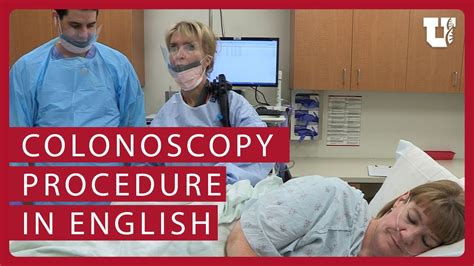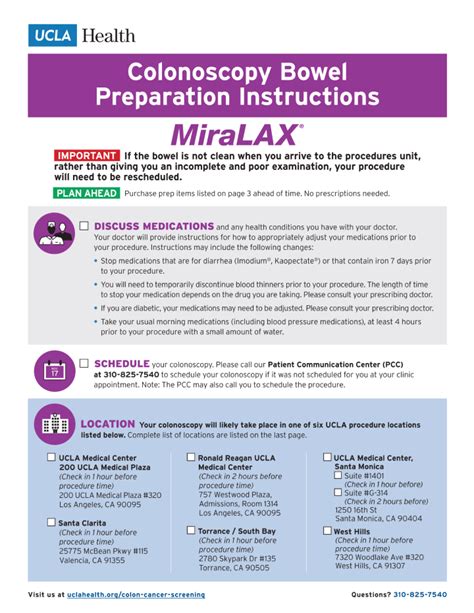Intro
Prepare for a colonoscopy with our expert guide, covering colonoscopy prep, bowel preparation, and colon health to ensure a smooth procedure and accurate results.
Preparing for a colonoscopy is a crucial step in ensuring the procedure is successful and effective in detecting any potential issues with the colon. A colonoscopy is a medical procedure that allows doctors to visually examine the inside of the colon and rectum for any signs of colon cancer, polyps, or other abnormalities. The preparation process typically begins several days before the scheduled procedure and involves a combination of dietary changes, bowel preparation, and other instructions to ensure the colon is clean and free of any debris.
The importance of proper preparation cannot be overstated, as it directly affects the accuracy and effectiveness of the colonoscopy. If the colon is not properly cleaned, the doctor may not be able to see the entire colon, which can lead to missed diagnoses or the need for repeat procedures. Furthermore, a clean colon reduces the risk of complications during the procedure, such as perforation or bleeding. By following the preparation instructions carefully, patients can help ensure a safe and successful colonoscopy.
In addition to the medical benefits, proper preparation can also help reduce anxiety and stress associated with the procedure. When patients are well-informed and prepared, they are more likely to feel calm and confident, which can make the entire experience more manageable. By understanding the preparation process and what to expect, patients can take an active role in their care and make informed decisions about their health.
Understanding The Colonoscopy Procedure

The colonoscopy procedure typically takes about 30-60 minutes to complete and is performed under sedation to minimize discomfort. During the procedure, a flexible tube with a camera and light on the end is inserted into the rectum and guided through the colon. The doctor will visually examine the inside of the colon, looking for any signs of abnormalities, such as polyps, tumors, or inflammation. If any suspicious areas are found, the doctor may take a biopsy or remove polyps during the procedure.
Benefits Of A Colonoscopy
The benefits of a colonoscopy are numerous and well-documented. One of the most significant advantages is the ability to detect colon cancer at an early stage, when it is most treatable. Colon cancer is one of the most common types of cancer, and early detection is critical for successful treatment. A colonoscopy can also help identify and remove precancerous polyps, which can reduce the risk of developing colon cancer.In addition to detecting colon cancer, a colonoscopy can also help diagnose other conditions, such as inflammatory bowel disease, diverticulitis, and gastrointestinal bleeding. The procedure can also help identify the cause of symptoms such as abdominal pain, changes in bowel habits, and rectal bleeding.
Preparation Instructions

The preparation instructions for a colonoscopy typically begin several days before the scheduled procedure. The specific instructions may vary depending on the doctor or medical facility, but generally include the following:
- Dietary changes: Patients are typically instructed to follow a low-fiber diet for several days before the procedure, which includes avoiding foods such as beans, nuts, and raw vegetables.
- Bowel preparation: Patients will be instructed to take a bowel preparation medication, which helps to cleanse the colon of any debris. The medication may be taken in the form of a liquid, pill, or powder, and is usually taken the day before the procedure.
- Fluid intake: Patients are encouraged to drink plenty of fluids, such as water, clear broth, or electrolyte-rich beverages, to help replace lost fluids and electrolytes.
- Medication instructions: Patients may be instructed to stop taking certain medications, such as blood thinners or iron supplements, several days before the procedure.
Types Of Bowel Preparation
There are several types of bowel preparation medications available, each with its own advantages and disadvantages. The most common types of bowel preparation include:- Polyethylene glycol (PEG): This is a liquid medication that is taken in large quantities to help cleanse the colon.
- Sodium phosphate: This is a pill or powder that is taken to help draw water into the colon and soften stool.
- Magnesium citrate: This is a liquid medication that is taken to help stimulate bowel movements and cleanse the colon.
What To Expect During The Procedure

During the colonoscopy procedure, patients can expect to experience some discomfort, but the sedation will help to minimize any pain or anxiety. The procedure typically takes about 30-60 minutes to complete, and patients will be monitored closely throughout the procedure.
After the procedure, patients will be taken to a recovery area where they will be monitored for any complications or side effects. Patients may experience some bloating, gas, or discomfort after the procedure, but these symptoms are usually mild and temporary.
After The Procedure
After the colonoscopy procedure, patients will be given instructions on how to care for themselves and what to expect during the recovery period. The instructions may include:- Dietary restrictions: Patients may be instructed to follow a low-fiber diet for several days after the procedure to help the colon heal.
- Fluid intake: Patients are encouraged to drink plenty of fluids to help replace lost fluids and electrolytes.
- Medication instructions: Patients may be instructed to take medications to help manage any discomfort or side effects.
- Follow-up appointments: Patients will be scheduled for a follow-up appointment to discuss the results of the procedure and any further treatment or testing that may be needed.
Risks And Complications

As with any medical procedure, there are risks and complications associated with a colonoscopy. The most common risks and complications include:
- Bleeding: There is a small risk of bleeding during or after the procedure, which can be treated with medications or other interventions.
- Perforation: There is a small risk of perforation, or tearing, of the colon during the procedure, which can require surgical repair.
- Infection: There is a small risk of infection after the procedure, which can be treated with antibiotics.
- Adverse reactions to sedation: Some patients may experience adverse reactions to the sedation, such as nausea, vomiting, or respiratory problems.
Reducing Risks And Complications
To reduce the risks and complications associated with a colonoscopy, patients can take several steps, including:- Following preparation instructions carefully
- Informing their doctor about any medical conditions or allergies
- Asking questions and seeking clarification about the procedure and any concerns
- Following post-procedure instructions carefully
Conclusion And Next Steps

In conclusion, preparing for a colonoscopy is a critical step in ensuring the procedure is successful and effective in detecting any potential issues with the colon. By following the preparation instructions carefully, patients can help reduce the risks and complications associated with the procedure and ensure a safe and successful outcome.
After the procedure, patients will be given instructions on how to care for themselves and what to expect during the recovery period. Patients should follow these instructions carefully and seek medical attention if they experience any unusual symptoms or side effects.
Final Thoughts
A colonoscopy is a valuable tool in the detection and prevention of colon cancer and other gastrointestinal conditions. By understanding the preparation process and what to expect during the procedure, patients can take an active role in their care and make informed decisions about their health.What is a colonoscopy and why is it necessary?
+A colonoscopy is a medical procedure that allows doctors to visually examine the inside of the colon and rectum for any signs of colon cancer, polyps, or other abnormalities. It is necessary for the early detection and prevention of colon cancer, as well as the diagnosis of other gastrointestinal conditions.
How do I prepare for a colonoscopy?
+To prepare for a colonoscopy, patients are typically instructed to follow a low-fiber diet for several days before the procedure, take a bowel preparation medication, and drink plenty of fluids. Patients should also inform their doctor about any medical conditions or allergies and follow any specific instructions provided.
What are the risks and complications associated with a colonoscopy?
+The most common risks and complications associated with a colonoscopy include bleeding, perforation, infection, and adverse reactions to sedation. However, these risks can be reduced by following preparation instructions carefully, informing the doctor about any medical conditions or allergies, and following post-procedure instructions carefully.
How long does a colonoscopy take and what can I expect during the procedure?
+A colonoscopy typically takes about 30-60 minutes to complete and is performed under sedation to minimize discomfort. During the procedure, a flexible tube with a camera and light on the end is inserted into the rectum and guided through the colon. The doctor will visually examine the inside of the colon, looking for any signs of abnormalities.
What happens after the colonoscopy procedure?
+After the colonoscopy procedure, patients will be taken to a recovery area where they will be monitored for any complications or side effects. Patients may experience some bloating, gas, or discomfort after the procedure, but these symptoms are usually mild and temporary. Patients will be given instructions on how to care for themselves and what to expect during the recovery period.
We hope this article has provided you with a comprehensive understanding of the colonoscopy procedure and what to expect. If you have any further questions or concerns, please do not hesitate to reach out to your doctor or healthcare provider. Remember to share this article with friends and family who may be preparing for a colonoscopy, and encourage them to take an active role in their care. By working together, we can promote healthy lifestyles and reduce the risk of colon cancer and other gastrointestinal conditions.
